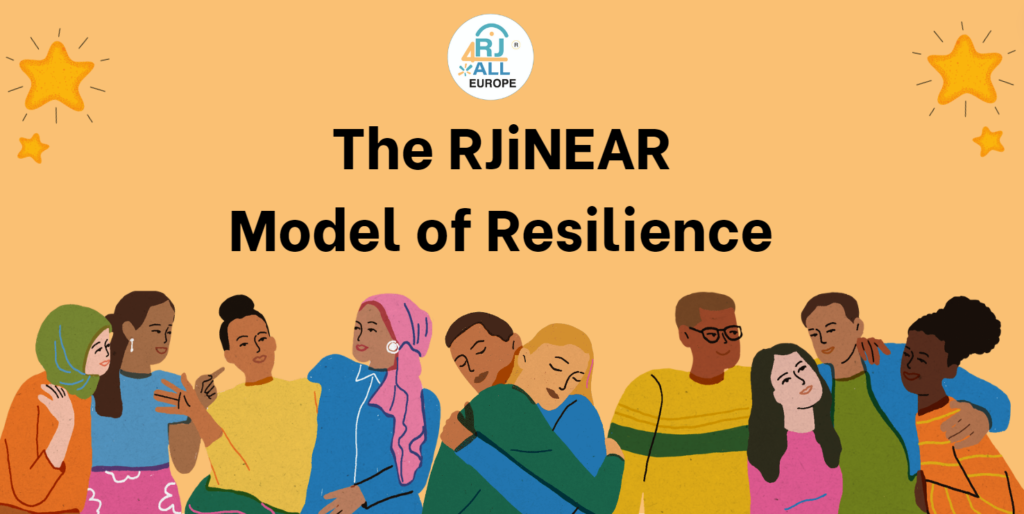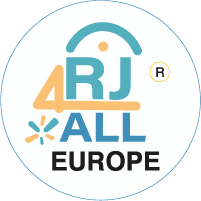
The problem
Harm results from a complex interplay of societal factors that extend beyond individual actions. In examining harm, the emergence of radicalised and extremist views becomes a prominent concern in our contemporary global landscape. Developing extremist views that lead to violence often involves a rather complex journey influenced by various factors across different levels of the social ecology (Ellis et al., 2022). This non-determined path is shaped by personal and collective, social, and psychological influences, with social networks playing a crucial role. Therefore, the act of harming (including the adoption of extreme ideologies) is not the result of a single experience or problem, but rather a culmination of influences across various dimensions of an individual’s life trajectory.
At the same time, the journey to becoming independent and truly understanding ourselves is not easy. It involves facing difficulties, mixed feelings, and being open to vulnerability. Especially during the teenage years, identity formation is accelerated and remains an ongoing process as we search for a self-authored identity. Through the process of maturation, the emergent sense of self is often vulnerable to strong reactions, confusions, resistance to perceived rigid authority and misalignment in an effort to stand out as unique. Given the pervasive way some extreme beliefs are growing in the contemporary era, young people, who stand particularly vulnerable to influence, are worryingly exposed.
The traditional approach
Traditionally, criminologists have used psychology and science to understand and reduce violence by focusing on negative traits that lead people to harm and bad behaviour.
This approach is encapsulated in the Risk Need Responsivity (RNR) model of rehabilitation, conceived in the 1980s by Andrews, Bonta, and Hope (1990). The crux of RNR lies in the identification of the risks that expose individuals to harm, coupled with the management of these risks through incarceration, rehabilitation, and various programmes.
However, despite its historical prevalence, this approach is facing significant challenges on practical, policy, political, and financial fronts on an international scale (Gavrielides, 2015; 2022). The limitations of the traditional model have become increasingly apparent, prompting a critical reassessment of its efficacy. It is now evident that there is a need for a more holistic approach that not only identifies risks but also addresses the broader socio-cultural and systemic factors influencing criminal behaviour.
Our innovative approach
According to Maruna (2006) and Gavrielides (2013; 2015; 2021), concentrating on criminogenic needs is not a sufficient condition when it comes to building psychosocial resilience against the factors that lead to violence and harm including extremism.
To do this, we implement the RJiNEAR model, which is a resilience and wellbeing psycho-social model drawn from the principles and teachings of restorative justice, positive criminology, and positive psychology as well as psychotherapy and developmental coaching. RJiNEAR forms a theoretically driven way of working with normal psychological variables, like perception, reasoning, emotions, social influences, and responses, that facilitate positive identities and personal growth and argue that these can implicitly also strengthen the individual’s resilience to being drawn into adopting extremist beliefs and values.
RJiNEAR activities are designed to scaffold personal accountability for managing personal actions by focusing on deliberate choice, agency, moral reasoning methods, challenging misconceptions, openness to multiple points of views and the value of empathy and positive relationships for optimal living. The RJiNEAR activities equip and empower participants by:
• providing a philosophical inquiry platform for reflecting and authoring alternative, socially inclusive narratives and worldviews;
• recognising the critical contribution of normal emotional responses to hurt or errors or misunderstandings as part of learning and development;
• fostering opportunities to enhance resilience, engender hope and clarity of purpose, and usher positive future perspectives.
The RJiNEAR Model of resilience, crime prevention and control

RJiNEAR stands for
RJ = restorative justice +
i (myself)
N New knowledge about myself
E Emotional agility
A Awareness of options & choice
R Responding with growth ‘in spite of …’
It originated from the iNEAR model which was first articulated in 2017 by Professor Tunariu (Tunariu, Boniwell & Rufon, 2017) and Bonwell & Tunariu (2019). Subsequently, RJ4All Founder and Director, Professor Theo Gavrielides advanced the model using restorative justice, including power sharing, dialogue, fairness, equality and autonomy (Gavrielides, 2015; 2022).
The model works towards a positive, growth-oriented change in life where a person at risk works on the development of the values, skills and resources towards life based on human goods. The model also draws on community power and community involvement in proving a holistic approach to preventing extremist ideologies and indeed violent actions motivated by hate and extremism.
The ultimate objective of the programme is to build resilience and achieve transformation through participation.
Domains of Change
It is a psychosocial programme set up to address and foster the development of the best-version-of-me (Tunariu et al., 2017) and engaged citizenship across several interrelated psycho-social domains of change
including the psycho-social domains of change
including the restorative justice ethos as a cross-cutting one. These domains are:
1. Positive identity: self-concept; self-relatedness; self-presentation; self-worth; selfefficacy.
2. Emotional intelligence & relational competence: emotional regulation; relating to others; empathy.
3. Ideological flexibility & social liaison: perception of choice, options and alternatives; citizenship and diversity; community.
4. Responding with resilience
a. Existential ethics and
uncertainty: tolerance; self-soothing skills; malleability
b. Growth and well-being: linking
values, emotions and behaviours; internal congruence (self-governing vs.
compliance to pressures).
5. Restorative justice ethos: power-sharing; identifying, forging and restoring social liaison; pain and reconstruction.
Our RJiNEAR programme is structured as a series of 8 self-contained lessons, seamlessly integrated into 5 one-hour sessions, covering the following topics:
- Positive identity
- Emotional Intelligence
- Positive relationships
- ideological Flexibility
- Responding with Resilience
Building on success
The model forms part of RJ4All’s wider programme on “Preventing & Addressing Violent Radicalisation and Extremism”. Several publications, videos, handbooks and manuals have been produced as a result of this model. RJiNEAR has been tested through various pilots in the UK with direct interventions in formal and informal settings. In particular, the model was first piloted in 2016 at Abbey College involving a sample of 350 young people aged 11 and 12 (Tunariu, Boniwell & Rufon, 2017). In 2020, RJ4All UK carried out a community-based pilot in Southwark called “My Voice – My Future”. This was funded by Southwark Council, and provided new evidences that turned the RNR approach on its head.
Subsequently, RJ4All delivered the European Commission funded projects Restorative Dialogue Against Violent Radicalisation (RDaVR) and Mobilizing against extremism through countering and diverting radicalization of young people (RADEX). Both these European projects, were built on Gavrielides’ 3 year pilots of the model in 7 European countries. These pilots were carried out as part of the YEIP project and led to a series of scientific publications and books. Lastly, since 2022, RJ4All has been running the Youth Clubs+ Building Youth Resilience program in the UK as part of our mission to offer young people accessible, free, and positive opportunities. In these workshops, spread over a week, we engage around 20 children aged 10 to 16 in activities and presentations focused on different themes, covering all 8 areas of learning under the RJiNEAR model. The goal is to foster resilience and gradually build positive identities among the participants.
Live TV interview where Dr Gavrielides gives new evidence for a positive approach to violent youth radicalisation. This is based on restorative justice and positive psychology tested through a pan-European programme titled “The Youth Empowerment and Innovation Project”
The Youth Clubs consists of 5 day (9:30 – 16:30) set of activities with around 20 children from age 10 to 16 combining:
1. Structured sports (e.g. boxing, football, walking)
through our sports branch, RJ4All Sports
2. Art and skill workshops
3 Resilience workshops consisting of a series of 8 self-contained lessons, seamlessly integrated into 5 one-hour sessions.
The Youth Clubs consist of a set of activities designed to facilitate the formation of positive identities through the acquisition of skills for growth and personal flourishing. This is an evidence-based intervention that we know can have an impact on young people who are at risk of getting caught up in violence. Our programme follows an appreciative inquiry approach and builds on awareness about self, others and self-with-others to derive new resources and meanings as well as engagement with the notions of social responsibility, ethics and existential choice.
YEIP constitutes one of the largest youth-led studies on violent youth radicalisation in Europe. It was carried out by 75 young researchers from seven EU countries under the direction of Dr. Theo Gavrielides. It piloted a positive approach to violent radicalisation and extremism through the use of positive criminology and restorative justice. In total, YEIP directly engaged with and spoke to 3540 individuals from 16 years old to 78 and led to the design of a youth-led, positive policy prevention framework for tackling and preventing the marginalisation and violent radicalisation among young people in Europe.
All relevant publications can be found here
- Gavrielides, T. (2023) Preventing violent radicalisation in criminal jsutice settings: A Restorative Justice approach – Summary research findings from Turkey, the UK, Ireland, Romania and Spain, London: RJ4All Publications, ISBN: 978-1-911634-76-8. DOI: 10.13140/RG.2.2.25278.77125
- Gavrielides, T. (2022) Restorative justice & Violent Radicalisation in criminal justice settings. A training handbook, London: RJ4All Publications, ISBN: 978-1-911634-61-4. DOI: 10.13140/RG.2.2.22380.44166.
- Gavrielides, T. (2022) A positive prevention approach to violent youth radicalisation: advanced level 2 training handbook, London: RJ4All Publications. ISBN: 978-1-911634-65-2. DOI: 10.13140/RG.2.2.18533.47843.
- Gavrielides, T. (2022) Research findings on violent youth radicalisation in the UK, Cyprus, France, Greece and Belgium, London: RJ4All Publications, ISBN: 978-1-911634-54-6.. DOI: 10.13140/RG.2.2.32794.11207.
- Gavrielides, T. (2022) Restorative justice & Violent Radicalisation in criminal justice settings: a comparative overview from the UK, Italy, Turkey, Spain, Ireland and Romania, London: RJ4All Publications, ISBN: 978-1-911634-62-1.
- Gavrielides, T. (2021) “Power, fear and security: The terrorist within” in Gavrielides, T. (Eds) Power, Race & Restoration: The dialogue we Never Had. Abingdon: Routledge.
- Gavrielides, T. (2020). “Violent Youth Radicalisation in Europe: The youth-led model”, Internet Journal of Restorative Justice, ISBN: 978-1-911634-22-5
- Gavrielides, T. (2020) New Directions in Preventing Violent Youth Radicalisation, London: IARS. ISBN 978-1-907641-64-0.
- Gavrielides, T. and Santiago, I. (2018). Human Rights and Violent Extremism, 18th ASEM Informal Human Rights Seminar, Indonesia: ASEF.
- Gavrielides, T, Nemutlu, G and A.M. Șerban, (2018). Human Rights Education and Youth Work, Estonia: Youth for Human Rights.
- Gavrielides. T (2018) “Pull and Push factors of violent extremism“, Workshop 18th ASEM informal Human Rights Seminar, Indonesia: ASEF.
- Gavrielides T. (4-8 November 2018), 18th Human Rights Seminar, A European story of facts and fiction, Yogyakarta, Indonesia.
- Gavrielides, T. (3-5 May 2018). Restorative Justice & Radicalisation: From theory and practice, 2nd Bi-annual International Conference on Restorative Justice, Tehran – Iran. To read the Abstracts that were discussed at the 2nd Biennial International Conference on Restorative
- Justice: Restorative Justice as a Bridge between Silk Road Civilizations” click here
- Gavrielides, T. (2018). “Street group violence and restorative justice”, Unitedworld Law Journal, Vol 2, Issue: I, ISSN: 2457-0427.
- Gavrielides, T. (2018). Youth radicalisation, restorative justice and the Good Lives Model: Comparative Findings from seven countries, London: IARS Publications, ISBN: 978-1-907641-48-0.
- Gavrielides, T. (2018). Human Rights and Restorative Justice, London: RJ4All Publications. ISBN 978-1-911634-00-3.
- Gavrielides, T. (2018). Equality Matters for Restorative Justice, London: RJ4All Publications. ISBN
- Gavrielides, T. (9-10 May 2017), The terrorist within & restorative justice, Conflict in Europe: Meeting the challenge IIRP Conference, Dublin, Ireland
- Gavrielides, T. 3-5 April 2017, A youth-led approach to radicalisation and insecurity: An alternative vision for social cohesion, The MARGIN project Final conference, Horizon 2020 Budapest, Hungary.
- Gavrielides, T. (2016). “The terrorist within: from a restorative lens”, Special Issue Justice Report – Guest Editor Winterdyk, J., Canadian Criminal Justice Association
- Gavrielides, T. (2016). “The Death of Democracy and the Forces of Power and Control: The Case of Europe”. Social Sciences Journal. 5(3), pp. 42; doi:10.3390/socsci5030042.
- Gavrielides, T. and Worth, P (2014). “Another push for restorative justice: Positive psychology & offender rehabilitation” in Crime: International Perspectives, Socioeconomic Factors and Psychological Implications, New York: Nova Science Publishers.
- Gavrielides, T. (2012). “Contextualising Restorative Justice for Hate Crime”. Journal of Interpersonal Violence Vol 27, Issue 18, pp. 3624 – 3643. https://doi.org/10.1177/0886260512447575
- Gavrielides, T. (2010) “The new politics of community cohesion: Making use of human rights policy and legislation”, Vol 38: 3 Policy & Politics, pp 429-445. ISNN0305 5736.


